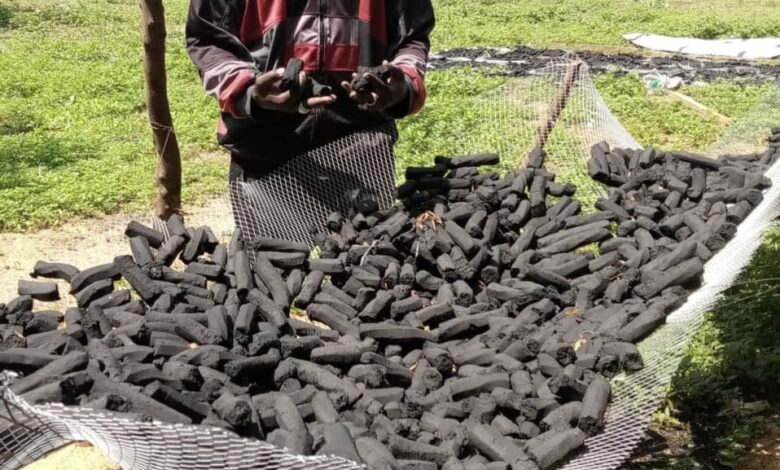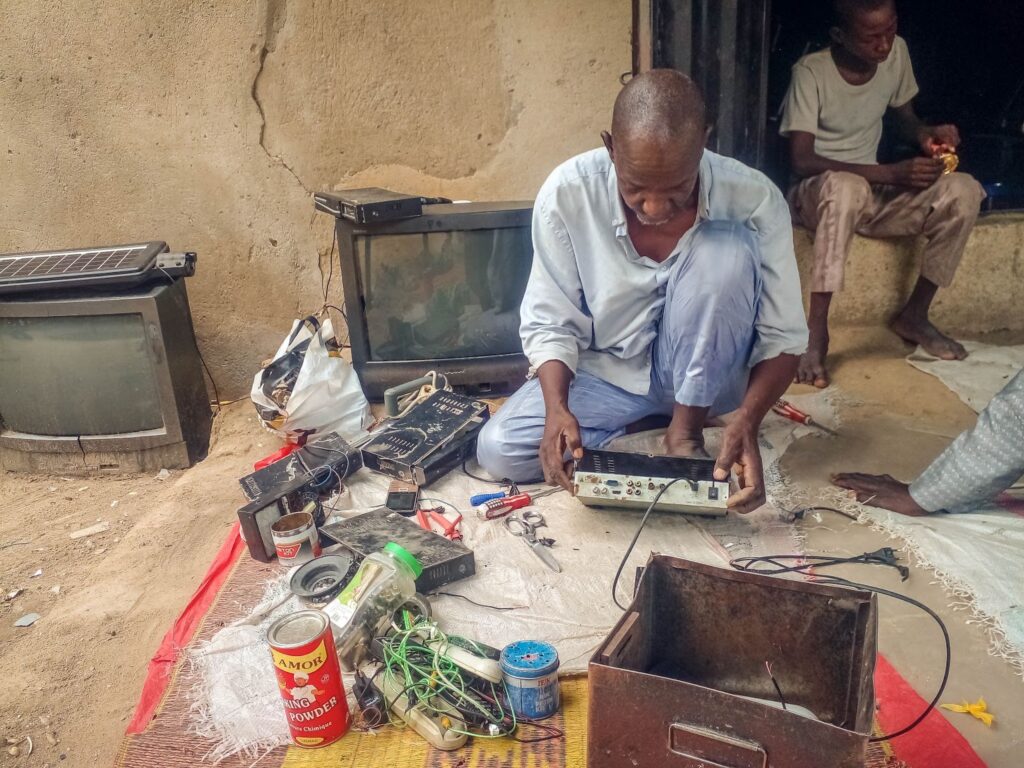Aja Bukar had just returned from his farm when we met him at his home in Auno, a small village on the outskirts of Maiduguri, North East Nigeria. His 16-hectare farm field is half-cultivated due to severe drought and financial strain.
“It was very bad last season,” he recalled. “We planted a bag of rice seeds but we could barely gather 16 small bowls.” The middle-aged father of two is one of many farmers whose livelihoods are eroding under the worsening impacts of climate change, as droughts grow more severe in the state.
The problem is far beyond the corridors of the northeastern region. HumAngle had revealed how locals are battling several health conditions in Obrikom, a community in the Niger Delta region, due to harmful pollutants from gas flaring. The climate-driven drought and the toxic emissions from oil extraction are connected by a shared reality: Nigeria’s struggle to manage the environmental impacts of climate change and industrial activities. The country has made high-level commitments under the Paris Agreement, pledging to reduce greenhouse gas emissions, improve resilience, and transition to a low-carbon economy. The pledge to keep global temperature increase within the 1.5 — 2°C target, as outlined in Article 2 of the Agreement, should ideally offer security for communities. For those on the front line, however, the ambitious vision remains largely disconnected from their daily realities.
Now, delegates are set to converge in Baku, the capital city of Azerbaijan for the 29th session of the Conference of the Parties (COP29) to the United Nations Framework Convention on Climate Change (UNFCCC) in November. As this event approaches, the urgency for Nigeria to bridge this gap between policy and practice becomes even clearer.
The Human Cost of Climate Commitments
In Nigeria’s northeastern region, communities are bedevilled by the compounding impacts of insecurity and climate change, facing issues like water scarcity, rising temperatures, desert encroachment, and soil degradation. These environmental challenges have led to a decline in livelihoods, with agricultural productivity reducing due to erratic rainfall and prolonged droughts. For many residents, the land that once sustained them now yields less, driving vulnerable communities into deeper poverty and increasing dependence on aid.
Reports from the International Committee of the Red Cross (ICRC) reveal a sharp rise in malnutrition among children in the region, with climate change emerging as a significant driver. Malnutrition rates have surged by 24 per cent over the past year, largely attributed to reduced agricultural output and unpredictable weather patterns. These consequences resonate with Article 2(b) of the Paris Agreement, which aims to “increase the ability to adapt to the adverse impacts of climate change and foster climate resilience.” However, for affected individuals across the region, these adaptation goals remain distant and abstract. In their reality, climate resilience is an urgent need, not just a policy aspiration.
Contrarily, communities in the Niger Delta, such as the Obrikom village, face a different but equally severe climate burden: the persistent impact of gas flaring. Gas flaring is a routine practice in the region, where oil and gas extraction have led to unchecked emissions that pollute the air and water. High levels of pollutants in the atmosphere have become a fact of life, causing respiratory issues, skin rashes, and other health complications for residents. For instance, a five-month-old baby was diagnosed with acute bronchitis due to prolonged exposure to these pollutants. Despite Nigeria’s commitments to reduce emissions, however, gas flaring continues, raising concerns about the effectiveness of the country’s climate policies.
In the Ogba-Egbema-Ndoni area, 171 million Mscf of gas (valued at $598.5 million) was flared between March 2013 and March 2024, releasing 9.1 million tonnes of CO₂ into the atmosphere, according to data from the Nigerian Gas Flare Tracker. This contrasts Article 2(c) of the Paris Agreement which commits to “making finance flows consistent with a pathway towards low greenhouse gas emissions and climate-resilient development”. The statistics signify not only the environmental and health toll on communities but also the significant economic waste from flaring practices that could have been directed toward sustainable energy solutions, experts said.
The promises enshrined in national policies, such as Nigeria’s Climate Change Act of 2021, aim to create an institutional framework to achieve these ambitious climate goals. Following COP26, this Act signalled Nigeria’s commitment to achieving net-zero emissions by 2050–2070 and required the establishment of the National Council on Climate Change (NCCC) to oversee and coordinate the country’s climate actions. However, the establishment of councils and budgets has yet to translate into meaningful, on-the-ground change. The gap between policy language and real impact leaves many wondering whether these frameworks are designed with their needs in mind.
For frontline communities in both the Northeast and the Niger Delta, these policies remain theoretical without immediate, tangible impact. Nigeria’s Climate Change Act and National Climate Change Action Plan include legally binding emissions targets, yet the efficacy of these initiatives is undermined by funding gaps, political instability, and limited enforcement. In the Northeast, food security and sustainable water management remain pressing concerns, while in the Niger Delta, residents continue to grapple with pollution and its devastating health impacts.
As Nigeria champions its climate commitments at COP 2024, the struggles of communities underscore the urgent need to design climate policies that prioritise those who bear the brunt of climate change. For these individuals, success is not measured by emissions reductions or global accolades alone, but by tangible improvements in their daily lives, from clean air and water to reliable food sources and health security.
Under the Paris Agreement, Nigeria has pledged to reduce greenhouse gas emissions by 20 per cent by 2030, with an additional 47 per cent reduction contingent on international support. The Climate Change Act of 2021 has institutionalised these targets, requiring that Nigeria’s emissions fall within a legally defined carbon budget set every five years to align with global warming limits. However, the road to meeting these commitments is complex, with the nation grappling with economic dependency on fossil fuels, political challenges, and infrastructure gaps.
The biggest roadblock to Nigeria’s climate goals is its reliance on oil, especially with the push for new oil projects like the one in Kolmani in the Northeastern region. In 2022, the oil sector accounts for 67 per cent of carbon dioxide (CO2) emissions. Reducing this dependence is challenging due to oil’s economic importance. President Buhari’s 2021 pledge to reach net-zero emissions by mid-century is ambitious, but without substantial investment in clean energy, a realistic transition seems far off. Although the Climate Change Act established a carbon budget and sector-specific emissions regulations, enforcement is a major challenge, especially when short-term economic gains from oil contrast with long-term climate targets.

Political instability and conflict further complicate climate policy implementation. Conflict zones in the Northeast, for instance, face frequent disruption in infrastructure projects, while funds intended for climate action are often diverted to address immediate security concerns. Reports of misappropriated climate funds and limited transparency hinder the climate governance framework, as oversight and accountability need to be more consistent. A recent report by the Punch reveals that Nigeria’s 36 states received a total of ₦39.6 billion as ecological funds between June 2023 and June 2024. These funds were set aside to mitigate severe environmental problems. The report indicated that Kano state received the highest allocation, totalling ₦2.1 billion, while Borno received ₦1.68 billion.
International funding and support are essential to meet these targets. Under Articles 9 and 11 of the Paris Agreement, developed countries are encouraged to aid developing nations, but the distribution of these funds is complex. Nigeria has received some support from organisations like the African Development Bank (AfDB) through mechanisms like the Climate Change Fund, yet this is not enough to fully operationalise its commitments.
The Role of Local Communities and Adaptation Efforts
In the face of limited government support, local communities have pioneered adaptation efforts to combat the effects of climate change. In Maiduguri, youth-led projects introduced the innovation of eco-friendly cooking charcoal, bio-waste and durable interlock bricks from plastic wastes, addressing the environmental and health impacts caused by these wastes. This aligns with Nigeria’s obligation under the Paris Agreement to promote climate resilience. These projects, however, remain small-scale and often depend on short-term funding, underscoring the need for integrated national support.

The Climate Change Act established the Climate Change Fund which was designed to finance grassroots adaptation initiatives and sustainable projects across Nigeria. This fund is crucial, as it aims to reduce the disparities in adaptation capacity between urban and rural regions.
In addition, Nigeria’s National Climate Change Action Plan mandates periodic adaptation plans. Yet, a report by the United States Institute of peace shows that these policies often exclude the voices of those most affected. Farmers and herders in Northern Nigeria, who rely heavily on the land, face unique challenges that cannot be addressed by generic national policies. To bridge this gap, community consultations are essential for crafting policies that reflect the needs of different regions.
As COP 2024 approaches, there is an opportunity for Nigeria to advocate for international funding that supports region-specific adaptation strategies. By showcasing successful local projects, Nigeria can make a case for community-centred climate adaptation and advocate for long-term funding to expand these efforts. This would not only enhance resilience, but it will also bring grassroots adaptation efforts into national and international climate strategies.
Unseen Costs and Underreported Angles
Beyond agriculture, environmental degradation from continued oil exploration adds another layer to the country’s climate contradictions. Fossil fuel activities contribute not only to emissions but also pose significant health risks to local communities, as contaminants pollute air and water sources. While Nigeria has ratified the Paris Agreement, the persistence of oil exploration raises questions about the true sustainability of its climate commitments.
Additionally, Nigeria’s struggle with waste management, particularly e-waste, underlines enforcement gaps in environmental policies. Despite the Basel Convention’s mandate, Nigeria remains a hub for electronic waste, which is often disposed of improperly. Informal waste recyclers are exposed to hazardous chemicals, and the resulting pollution further impacts communities near waste sites. Addressing these issues requires not only stricter enforcement but also a reevaluation of environmental priorities in alignment with the Paris Agreement.

Nigeria’s carbon budget, as outlined in the Climate Change Act, legally limits emissions within five-year increments to help meet the 1.5–2°C global warming target. Yet, ongoing industrial activities suggest a need for more stringent policy implementation. The contradictions between Nigeria’s climate goals and its economic dependencies underscore the challenges in balancing development with environmental protection.
The underreported toll of these environmental impacts sheds light on a troubling reality: without addressing these contradictions, Nigeria’s climate policies may remain symbolic. For communities affected by oil exploration and e-waste, the Paris Agreement’s promises ring hollow, as their health and livelihoods are compromised daily.
As COP 2024 nears, Nigeria must address these unseen costs to demonstrate a genuine commitment to its climate goals. By confronting these environmental challenges, Nigeria can build a more comprehensive climate strategy that protects both its people and its ecosystem.
Leveraging COP 2024 for Concrete Change
COP 2024 is a pivotal opportunity for Nigeria to advocate for targeted international support that meets its unique challenges. This conference provides a platform to spotlight the climate vulnerabilities of conflict-affected areas, emphasising Nigeria’s need for adaptation funding that directly benefits those in high-risk regions. Aligning with the Paris Agreement’s Article 9 on financial assistance, Nigeria can strengthen its call for aid to support critical adaptation projects.
Nigeria’s efforts to combat climate change are notable, yet it lags behind some peer nations in key areas, such as renewable energy adoption and transparency in climate finance. Unlike South Africa, which has made substantial progress in transitioning to renewable energy through public-private partnerships, Nigeria’s renewable energy sector is still underdeveloped, with an over-reliance on oil. South Africa’s National Renewable Energy Program, which incentivises private sector investment in wind and solar projects, could serve as a model for Nigeria to accelerate its clean energy initiatives.
Another relevant comparison is Kenya, which has excelled in community-centred adaptation programs and sustainable agriculture, particularly through its Climate Smart Agriculture Strategy. Kenya has implemented regional agricultural initiatives that support smallholder farmers in adapting to drought and erratic weather, which could be a valuable framework for Nigeria. By developing similar, localised adaptation programs, Nigeria could enhance resilience in its northern regions where farmers struggle to maintain crop yields amidst climate variability.
Nigeria could also look to Ethiopia for strategies in forest management and carbon sequestration. Ethiopia has invested in reforestation and afforestation projects to combat land degradation and reduce emissions, notably through its Green Legacy Initiative, which aims to plant billions of trees. Given Nigeria’s challenges with deforestation, especially due to logging for charcoal, adopting a similar reforestation strategy could support both carbon reduction goals and ecosystem resilience.
To ensure accountability, Nigeria’s participation at COP 2024 should include a commitment to transparency in climate finance. Establishing robust reporting systems will enable Nigeria to track how funds are used, ensuring that they reach communities like those in the Northeast, where climate impact is most severe. An emphasis on transparency aligns with the Paris Agreement’s enhanced transparency framework, fostering international trust and accountability.
Nigeria could also champion a coalition with neighbouring nations at COP 2024 to advocate for African-specific climate priorities. By creating partnerships with countries that face similar challenges, Nigeria could push for regional funding and support for adaptation, infrastructure, and clean energy. This collaboration would allow Nigeria to address its energy transition while strengthening its position in the global climate arena.
COP 2024 offers a stage for Nigeria to share its Long-Term Low Emission Development Strategy (LTS), required under Article 4 of the Paris Agreement. By focusing on investments in renewable energy and sustainable agriculture, Nigeria can outline a clear path toward reducing dependency on oil. This transition is essential not only for achieving emissions targets but also for creating economic stability and growth.
As Nigeria heads into COP 2024, it has an opportunity to advocate for both its immediate needs and its long-term vision. By benchmarking its progress against similar countries and adopting best practices, Nigeria can refine its climate strategies and strengthen its climate commitments. The stakes are high, and by aligning its goals with the Paris Agreement’s principles, Nigeria can turn global commitments into impactful change for its citizens.
Accountability and Future Directions
Nigeria’s climate future depends on robust accountability frameworks. The Climate Change Act establishes the National Council on Climate Change (NCCC) to monitor and implement Nigeria’s Paris Agreement commitments, but to be effective, this council requires transparent reporting and independent oversight. Ensuring that Nigeria’s climate policies are periodically evaluated aligns with the Paris Agreement’s Article 15 compliance framework, which emphasises facilitative, non-punitive compliance.
Framework laws like Nigeria’s Climate Change Act transform global climate commitments into actionable, enforceable national policies. By codifying its carbon budget, establishing emissions regulations, and requiring regular adaptation plans, Nigeria is creating a pathway for achieving its climate goals. Yet, the success of these measures hinges on consistent inter-institutional coordination and stakeholder engagement.
Community accountability is equally essential. As Nigeria’s climate strategy develops, regular community consultations and feedback mechanisms are needed to ensure that policies reflect the realities on the ground. Incorporating the voices of those affected by climate change enhances the legitimacy and effectiveness of climate action, reinforcing a people-centred approach.
Looking ahead, Nigeria’s commitments at COP 2024 should include a timeline for periodic assessments and adjustments to its climate goals. Establishing a roadmap for the next five years would provide a clear sense of direction and build public trust in Nigeria’s climate policies.
By setting benchmarks for accountability, Nigeria can ensure that the promises made under the Paris Agreement translate into concrete actions. For communities like Abubakar’s, these mechanisms offer a glimmer of hope that future generations will experience a Nigeria where climate policy goes beyond promises to deliver resilience and security.
